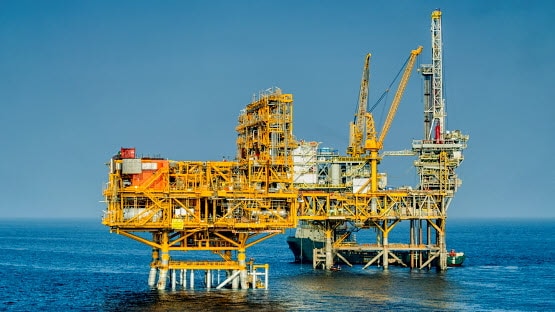
ECJ rules 'jackup' drilling rig does not qualify as a sea-going vessel for VAT
23/06/19
On 20 June 2019 the ECJ has ruled that the supply of an offshore jackup drilling rig does not qualify as a sea-going vessel. This means on the one hand that such drilling rigs cannot be (locally) supplied under the zero VAT rate and on the other hand that supplies of provisioning goods and services related to such drilling rigs also no longer qualify for the zero VAT rate. Given the considerable value of drilling rigs in general, the impact on cash-flow and working capital should not be underestimated.
Businesses operating in the offshore and oil field services industry are advised to review contracts, invoicing and ERP tax code set-up to ensure standard rated VAT is applied instead of the zero rate. A wider review of all stationary vessels currently treated as sea-going is also recommended as it may be expected that local tax authorities will apply a more restrictive view than just to jackup drilling rigs.

Background
In the GSP case (C-291/18), three jackup drilling rigs that were used for operations in the Black Sea were supplied by a Romanian company to three Maltese companies. The Romanian seller had applied the zero VAT rate (exemption with credit) of article 148c EU VAT Directive on this supply, whereas the Romanian tax authorities took the view that these supplies were subject to standard rated VAT. According to the Romanian tax authorities the basis for this position could be found in the fact that the drilling rigs do not sail during the drilling activities and were mainly used in the same stationary position during those drilling activities. As it was unclear to the Romanian referring court whether sailing offshore should predominate usage offshore, the following two questions (summarised) were referred to the ECJ:
- Can the zero VAT rate from Article 148(c) of the VAT Directive apply to the sale of offshore jackup drilling rigs, i.e. are they “vessels” within the meaning of that provision?
- If the answer to the first question is in the affirmative, is it an essential condition for that drilling rig to be in a state of movement while it is being used (for commercial/industrial activities), floating or moving at sea from place to place, for a longer period than the period during which it is stationary or immobile?
ECJ considers offshore drilling rigs were not mainly used for sailing at high seas
The ECJ reminds us that the exemption with credit for the supply of sea-going vessels depends mainly on the qualification of that vessel and whether or not it actually ‘sails’ at high seas. This applies regardless of whether a vessel is meant for passenger transport, industrial, commercial or fishery activities. Since there is no real definition of a ‘vessel meant for sailing at high seas’, the context and grammatical explanation should be taken into account. The wording ‘vessel meant for sailing’ implies that the floating installation should be sailing or at least mainly be used for moving at sea, which is supported by the various language versions of the EU VAT Directive. The aim of this exemption with credit is to promote international transportation and the ECJ also considers that exemptions in general need to be explained restrictively.
In this particular case it was established that the jackup drilling rigs consist of a floating platform with movable pillars which were jacked up during the transportation of the rig (with usage of tugboats or other vessels) to the drilling site. Once at the drilling site, the rig was lifted up by letting the movable pillars down so that these pillars could rest on the seabed enabling the rig as a static platform. These particular facts bring the ECJ to the judgement that the offshore drilling rigs were not mainly used for sailing, to be verified by the national referring court. The supply of drilling rigs such as the ones at hand can therefore not benefit from the VAT exemption with credit of article 148 under a and c EU VAT Directive.
Interestingly, the ECJ did not pay any attention to the fact that most of these rigs are registered in the international vessel register and are assigned a so-called IMO number from the International Maritime Organization
Potential consequences of this judgement for your company
The supply of jackup drilling rigs does not qualify as the supply of a sea-going vessel. The most important consequence of this judgement is that going forward these supplies are not subject to the zero VAT rate/exemption with credit and that in case of local supplies, in principle local VAT will be due. Given the considerable value of drilling rigs in general, the impact on cash-flow and working capital should not be underestimated.
A knock-on effect of this ruling is that any provisioning goods supplied to or any services related to the drilling rig can also no longer benefit from the zero VAT rate for supplies/services to sea-going vessels and are therefore subject to local VAT going forward. Of course cross-border elements need to be taken into account, but the basic rule for supplies between locally established taxable persons will no longer allow zero-rating.
Depending on the specific situation there may be possibilities to avoid that VAT becomes due. If the drilling rig would for example be purchased for usage outside territorial waters, the drilling could be exported by the seller and be zero-rated for that reason. Similarly, no VAT would be due if the drilling rig would not be located in territorial waters of a Member State at the time of supply. Another possible escape route may lie in the field of customs duty suspending regulations, which do allow for zero-rating from a VAT perspective if applied appropriately to the respective drilling rig. Obviously, usage of such regulations would not be possible for drilling rigs that are in free circulation of the EU.
Relevance for the Dutch practice
The rules with respect to zero-rating ‘sea-going vessels’ have changed in the Netherlands from 1 January 2019. Since then, the application of the zero VAT rate is only allowed if it can be proven that the vessel is sailing in international waters for 70% or more of its operating time. This criterion is no longer relevant for the drilling rigs in the case at hand, as they don’t qualify as sea-going vessels. The Dutch practice may need adjustment as there is currently a Decree from the Ministry of Finance on the basis of which drilling rigs are treated as sea-going vessels. It is questionable whether that practice can be upheld following this case.
What actions to pursue?
The most important outstanding question following this ruling is whether or not it impacts all drilling rigs/all vessels which are mainly stationary. At least for jackup drilling rigs it is now clear, but it is questionable whether it also applies to (all) other types of rigs, pontoons, etc. We feel that there should generally not be a discussion around zero-rating FPSOs, as these are mainly (former) vessels who are capable of sailing themselves and generally operate in deep water (i.e. outside territorial waters).
A number of actions are in any case recommended to assess the impact of this case for your company with respect to (future) transactions in jackup drilling rigs:
Consider whether it is possible to make use of other zero VAT rates (see above);
If this is not possible:
- review contracts and invoices for correctness (e.g. references to the respective zero VAT rate should be removed);
- make sure that the right tax code (VAT against standard rate) is selected in your system when the transaction is executed and the invoice is issued; and
- take into account the VAT financing element when selling/purchasing a jackup drilling rig.
We are available for support with respect to determining whether or not your rigs/vessels qualify as sea-going going forward taking into account this case. If and when Dutch policy is updated, we will of course inform you accordingly.
Contact



















